Weapons
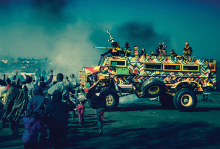
HANNAH ARENDT SAID we can ask of life, even in the darkest of times, a “redemptive element,” and art can be that—an affirmation of right, light, truth, some beleaguered beauty. But note well: Art is no escape from the problems of the world but, rather, a repurposing, a resistance. And, of course, this phenomenon of violence into art can go both ways. Michelangelo’s bronzes, including his colossal papal statue of Pope Julius II, were melted down into cannons and other weapons during the French Revolution. It’s our choice.
Here are four artists who chose to turn trauma—civil war, natural disasters, apartheid, and female genital mutilation—into sights to behold.
Ralph Ziman, South Africa
Designed and put into service in apartheid South Africa in the 1980s, the so-called Casspir, a mine-resistant and ambush-protected vehicle, has been subverted. Says South African artist Ralph Ziman: “The Africanization of the Casspir seemed to take away the terror it once evoked ... people felt comfortable to approach it, touch it, and share their stories and memories.” He elaborates on his intention: “To make this weapon of war, this ultimate symbol of oppressing ... to reclaim it, to own it, make it African, make it beautiful, make it shine.”
Born in South Africa in 1963, Ziman grew up in a strict system of institutionalized racial segregation and political and economic discrimination—“apartheid,” which translates in Afrikaans to “apartness.”
“I have vivid memories,” he says of his first sighting of a Casspir. It was April 1993. Charismatic leader Chris Hani had been gunned down outside his house in a Johannesburg suburb by a white nationalist. The artist drove to the funeral and saw columns of Casspirs descending the dusty streets; heavily armed police fired tear gas, shotguns, and automatic weapons. More of the same occurred the next day in Soweto, where police and army units parked their Casspirs along the highway and exchanged gunfire with members of the African National Congress. “Tear gas and smoke burned our eyes and into our memories, along with the sight of armed men on the Casspirs ... for me, covering this beast with beads is catharsis,” says Ziman.
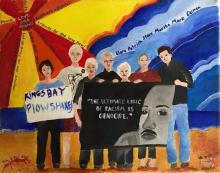
A group of about 20 peacemakers are embarking on an 11-day, 110-mile walk from Savannah, Ga., to Kings Bay, Ga. Named, “Disarm Trident: Savannah to Kings Bay Peace Walk,” the action is a call to abolish nuclear weapons globally and is supporting the seven Catholic activists arrested back in April on the Kings Bay Naval Submarine Base back in April.
“We will walk in nonviolence and prayer with the hope of bending the moral arc of the world towards justice and peace,” Kathy Kelly, one of the organizers of the walk, said in a news release.

“Somebody else walked up and said, ‘Can I see it?'” Parks said. “He pulled it back out and said, ‘With this loaded indicator, I can tell that it’s not loaded.'”
He pulled the trigger.
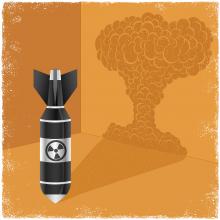
AS YOU READ this column, diplomats from the United States, the United Kingdom, France, Russia, China, Germany, and the European Union are working with their Iranian counterparts to finalize a deal concerning Iran’s nuclear program. I strongly believe that Christians should support the framework for this deal, announced in Lausanne, Switzerland, on April 2, as the best chance to prevent Iran from becoming a nuclear-armed state and—equally important—the best chance for the United States to avoid armed conflict with Iran.
In the days following the announcement of this framework, Sojourners authored and published a statement of support, which was signed by more than 50 Christian leaders (see statement here). Part of that statement reads as follows: “It is the sacred responsibility of all those entrusted with political power to pursue, with patient perseverance, every option that makes the destruction of war less possible, in order to protect human life and dignity. This becomes an even more urgent moral and spiritual imperative when we have the chance to prevent the further spread of nuclear weapons, with their terrifying potential of mass destruction ... a goal that reflects the binding commitments made by 191 U.N. member states, including the United States, under the Nuclear Non-Proliferation Treaty (NPT).”

We have weapons, and, in our brokenness, we tend to use whatever weapons we think will work.
Some of our weapons get assigned gender tags. Men, we say, tend to shout, bully, interrupt, trivialize, ignore “no,” and turn to violence. Women, we say, tend to manipulate, conspire, and blame.
But those tags mean little, and they don’t begin to describe the balance of abuse, which, as women know and men are learning, is overwhelmingly abuse of women by men.
Some weapons aren’t about gender. Some people use social status as a weapon. Age stifles youth, and youth embarrasses age. Long-timers freeze out newcomers, and the new form their own exclusive tribes. Wealth bullies poverty. The dominant race represses minorities. Heterosexuals bully homosexuals. Those with hiring power hire their own kind. More and more carry firearms and seem eager to use them.

If we're going to talk about food, we need to start with theology. Before chocolate was invented, a snake put "sinfully delicious" and "decadent" on the menu. Somebody fell for the marketing ploy, and we've had a complicated relationship with food ever since.
We've also had a complicated relationship with sex, and with siblings, and with weapons of mass destruction. It's all there in Genesis (where the WMDs are swords). And pretty soon, right-thinking people started coming up with rules to keep people from doing bad things. You can have sex with this person but not that one. You really shouldn't deceive, sell, or kill your brother. Beat your swords into plowshares.
The rules helped to restrain bad guys, and they gave would-be good guys some helpful pointers. Still, there were plenty of bad guys to go around, and good guys could get pretty anal about what other people should or shouldn't do. Anyway, it's obvious that you don't create a good marriage simply by avoiding sex with the wrong person, and you don't have a pleasant Thanksgiving dinner simply by not killing your siblings, and you don't banish war simply by wiping out as many weapons as possible. The rules are helpful — adultery, fratricide, and genocide are really bad ideas —but if you want a Peaceable Kingdom, you're going to need more than rules.
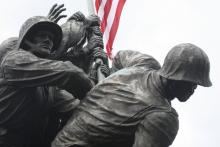
I wish that we, as a people, would speak better words to those who have served in our wars. I fear that we do them, and ourselves, a disservice when we call them all heroes without letting them decide which deeds were heroic and which should be left unspoken. When we call everyone who wears a uniform a hero, we diminish heroism everywhere.
I don’t mean we should refrain from thanking those who serve. If anything, we should thank them far more than we do, and our thanks should not just be in words. Our thanks should be sincere and long-lasting, and expressed in things like the best military hospitals we can afford, the best education we can provide, and our best efforts to ensure that their generation will be the last to endure what they have endured. Even if those ideals prove to be unattainable, we should not let that stop us from trying to attain them. As the Talmud says, “It is not your job to finish the work, but you are not free to walk away from it.”

Does violence rule our species? The barrage of international conflicts now in the headlines seems to suggest that violence may be the one language we have in common.
Though we all speak it fluently, very few of us learned it in school. We didn’t have to study its “vocabulary” and “grammar rules” – no, it was much easier than that. Humans pick violence up by immersion and so we are all native speakers. From Syria to Korea to Pakistan to Iraq to the U.S., the language of violence is so natural to us that we couldn’t recite one of its “grammar rules."
Sadly, ignorance of language rules does not diminish fluency. The odd thing is that if we stopped to learn the rules governing our fluency in violence, it would actually make us less fluent. Why? Because the rules of violence reveal an unpleasant reality: We don’t use violence; violence uses us.
I
The crumpled woman pushes through the door
and sees your plump limp limbs
held tight in my buckled arms.
She remembers holding
such sweet eternity.
As a mom of two small children – one who is the same age as children killed in Newton – I cannot imagine how hard it must have been for this dad to speak about his loss at the Senate Judiciary Committee recently about a proposed assault weapons ban. Thank you for your courage.
Now it's time to ask Congress to show some courage and enact sensible measures to prevent gun violence. Too many parents have already lost their children.
Visit NBCNews.com for breaking news, world news, and news about the economy

When the United States dropped atomic bombs on the Japanese cities of Hiroshima and Nagasaki in 1945, the world was ushered into a period of weapons paranoia. The Cold War, of course, was hallmarked by the obsessive weapons one-upmanship of the United States and the Soviet Union.
Who, then, would have thought that in the 21st century, the seeming weapon of choice would not be some sort of super-nuclear missile or an ultra-deadly biological toxin, but that it would, instead, be women?
“Women are being used as weapons of terror,” Dr. Rubina Greenwood told an audience last week at a congressional briefing on the rights of minority women in Pakistan organized by the Hindu American Foundation.
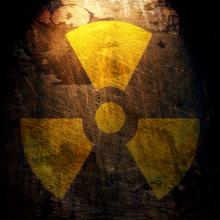
Kansas City, Mo., is in a unique position — it's the only city in the country where, this November, local voters will have a say over U.S. nuclear weapons policy.
That’s because the city council arranged a deal to finance a new nuclear weapons parts plant there; local bonds were issued and a local agency (the Planned Industrial Expansion Authority, PIEA) owns the plant. This is entirely unprecedented; nowhere else in the world has any entity other than a national government had direct financial involvement in nuclear weapons production.
When President Barack Obama laid out his deficit plan Monday, he wasn't just trying to sell a policy. When he pressed for tax hikes on the rich and announced, "This is not class warfare," he was trying to exorcise a demon that has bedeviled the Democratic Party for decades and in the process deprive the Republicans of one of their trustiest weapons. The reaction from the right was swift and sure: "Class warfare!"
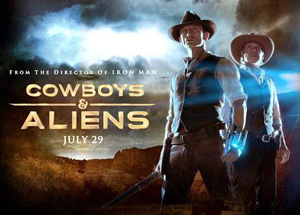 Americans have a hard time knowing how to respond to the sins of our colonial past. Except for a few extremists, most people know on a gut level that the extermination of the Native Americans was a bad thing. Not that most would ever verbalize it, or offer reparations, or ask for forgiveness, or admit to current neocolonial actions, or give up stereotyped assumptions -- they just know it was wrong and don't know how to respond. The Western American way doesn't allow the past to be mourned or apologies to be made. Instead we make alien invasion movies.
Americans have a hard time knowing how to respond to the sins of our colonial past. Except for a few extremists, most people know on a gut level that the extermination of the Native Americans was a bad thing. Not that most would ever verbalize it, or offer reparations, or ask for forgiveness, or admit to current neocolonial actions, or give up stereotyped assumptions -- they just know it was wrong and don't know how to respond. The Western American way doesn't allow the past to be mourned or apologies to be made. Instead we make alien invasion movies.

"The mental space [books] occupied is being eroded by the thousand Weapons of Mass Distraction that surround us all," Hari told me last week. "It's hard to admit, but we all sense it: it is becoming almost physically harder to read books."
[Okay, I admit I didn't actually talk with Hari. The quote is from his newspaper column. But pop over to Twitter, and you can see how, in effect, he gave me permission to paraquote him at #interviewbyhari.]
Anyway, where was I? Oh, yeah, long-form reading. Hari quotes David Ulin, author of The Lost Art of Reading: Why Books Matter in a Distracted Time, who wrote that he "became aware, in an apartment full of books, that I could no longer find within myself the quiet necessary to read." Ulin wrote that he would sit down with a book, and find his mind wandering, enticing him to check his email, or Twitter, or Facebook. "What I'm struggling with," he writes, "is the encroachment of the buzz, the sense that there's something out there that merits my attention."
After having spoken at the Greenbelt Festival in England a number of times now, we at the Center for Action and Contemplation always hoped and planned that we create a similar festival for spirituality and the arts in the United States. We had nothing comparable, and it was a niche waiting and needing to be filled. Therefore, we were honored to be a part of the first Wild Goose Festival in North Carolina last June, and hope that we can convene a truly ecumenical, radical, and socially engaged crowd of people living at the intersection of justice, spirituality, and creativity -- and those who want to be!